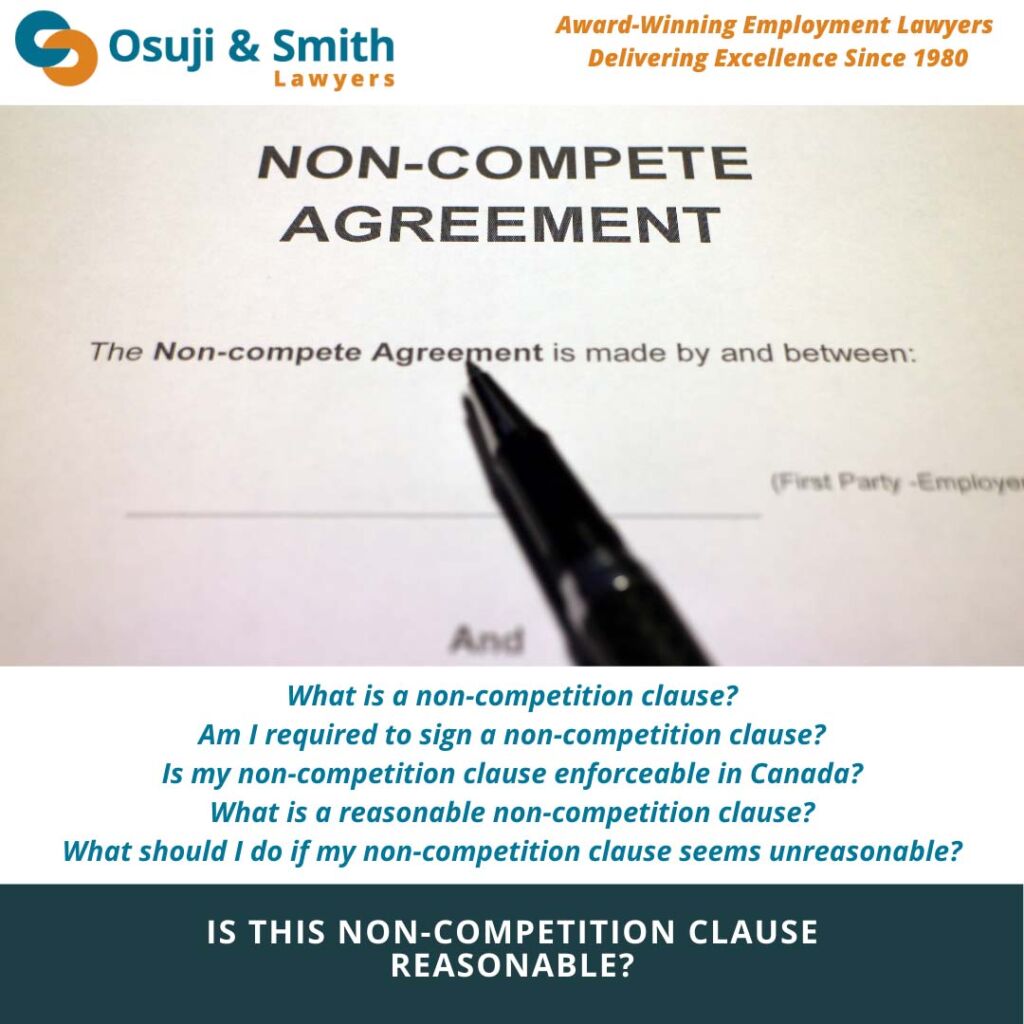Is this non-competition clause reasonable?
It’s common for an employer to ask you to sign a non-competition clause as part of your employment contract. But not all non-competition clauses are enforceable or reasonable. In this post, we’ll look at the top 5 questions about non-competition clauses in Alberta:
- What is a non-competition clause?
- Am I required to sign a non-competition clause?
- Is my non-competition clause enforceable in Canada?
- What is a reasonable non-competition clause?
- What should I do if my non-competition clause seems unreasonable?
What is a non-competition clause?
A non-competition clause (also called a non-compete clause) is a restrictive covenant that’s a part of an employment contract. This clause typically applies both during and after the employment relationship, and prohibits the employee from conducting business in competition with their employer.
Am I required to sign a non-competition clause?

Your employer is legally permitted to ask you to sign a non-competition clause as a condition of your employment. However, you have a choice. You can either accept the condition as part of your employment agreement, or choose to find employment elsewhere.
That said, non-competition clauses are often unenforceable, and Canadian courts have a history of looking unfavourably on contracts that restrict an individual’s ability to earn a living. If you’re asked to sign a non-competition clause as a condition of an employment opportunity you really want, have an employment lawyer review the employment contract first.
Is my non-competition clause enforceable in Canada?
Canadian courts view restrictive covenants as detrimental to employees, and non-competition clauses in particular are seen to limit market competition. Because of this, the courts typically deem a non-competition clause unenforceable.
To be enforceable in Alberta, a non-competition clause must:
- Clearly define the duration and geographical area to which the clause applies
- Clearly define the prohibited activities
- Not deviate from the industry standard practice
- Use the least intrusive means possible to protect the employer’s interest
- The employer’s interests must be legitimate and proprietary
- Consider the employee’s position
The language used in a non-competition clause must be clear and unambiguous. It should also be reasonable in terms of duration, geography, and scope of restricted activities.
If a non-competition clause is unfair or too restrictive to an employee’s right to pursue a career and to work for the employer of their choice, the courts will probably deem it unenforceable.
Also, a non-competition clause is usually unenforceable if the employee is wrongfully dismissed, and can lead to an extended reasonable notice period and the award of increased damages.
What is a reasonable non-competition clause?
So what is “reasonable” in terms of the duration, geography, and scope of a non-competition clause? The courts decide this on a case-by-case basis, but there are some general guidelines they seem to follow.
A reasonable duration is typically no longer than one year. Geographical restrictions and the scope of restricted activity may be considered reasonable as long as it doesn’t prevent a former employee from working in a region where the employer does not do business. For example, a specific area of a city is reasonable, but an entire province would probably be considered unreasonable.
What should I do if my non-competition clause seems unreasonable?
The best thing to do if you think your non-competition clause is unreasonable is to consult an experienced employment lawyer. The employment law attorneys at Osuji & Smith can review your employment contract, including your non-competition clause, to determine its enforceability. Contact us today.

